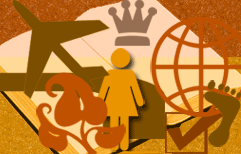ARCHIVED ISSUE
 Volume 2 • Number 5 • 2008
Volume 2 • Number 5 • 2008
● Exploring Literature: The Language and Logic of Liberation (Kawaida and Mato Oput)
by Itibari M. Zulu.
[ view PDF ]
● Intellectual Maroons: Architects of African Sovereignty
by Uhuru Hotep.
[ view PDF ]
Organized into four sections and using the metaphor of the journey toward enlightenment, this paper identifies six states of knowing called the Johari Sita that lie at the core of the intellectual maroon worldview. Thus, the six states provide the rudiments for an Africancentric model of identity formation, mission construction, and self-realization supportive of a drive for political and economic sovereignty.
● Communicating the Logic and Language of Black Liberation
by Jared A. Ball.
[ view PDF ]
This paper argues that the agency represented within a logic and language of Black liberation has been aggressively suppressed; thus, those interested in advancing it must be willing to engage themselves in a mass media environment to enter the levels of production and dissemination that can establish a transformative discourse.
● The Rhetoric of Revolution: The Black Consciousness Movement and the Dalit Panther Movement
by Antonette Jefferson.
[ view PDF ]
Using generic rhetorical criticism where the text is revolution, this work captures the response of the oppressed to acknowledge the collective struggle of people of African descent, and thus includes critiques of religion and friend-enemy identification in literature on revolution throughout the African Diaspora.
● Post-Colonial Reading Strategies and the Problem of Cultural Meaning in African/Black Literary Discourse
by Nelson O. Fashina.
[ view PDF ]
This paper is part of the author’s research into the possibility of carving a distinct critical canon for the reading of African/Black literature to illustrate that the African names of humans, flora and fauna, and objects used in African literary and cultural discourses are ritualistic and historical, and thus carry dense sacred meanings.
● Self-Emancipation and Slavery: An Examination of the African American’s Quest for Literacy and Freedom
by Anthony B. Mitchell.
[ view PDF ]
This paper traces the historical origins of American slavery, particularly in the southern part of the United States, and examines the African American quest for freedom in a nation constructed on the premise of White supremacy and racism.
● Barren Rivers and Flowery Women: Metaphors of Domination and Subjugation in Select Poems of Ebi Yeibo and Molara Ogundipe-Leslie
by Iyabode Omolara Daniel.
[ view PDF ]
This paper critically investigates how contemporary Nigerian poets employ nature as a metaphor to signify the dissonant relationship between the people of the Niger-Delta and the Nigerian government via the poems of Ebi Yeibo and Molara Ogundipe-Leslie.
● African Women, Tradition and Change in Cheikh Hamidou Kane's Ambiguous Adventure (1962) and Mariama Bâ's So Long a Letter
by Ginette Ba-Curry.
[ view PDF ]
The objective of this study is to show the plight of the Senegalese woman in pre-colonial, colonial and post-colonial Senegal through a comparative analysis of Cheikh Hamidou Kane’s The Most Royal Lady in Ambiguous Adventure and Mariama Bâ’s female characters in So Long a Letter; and to also examine how the roles of Senegalese women has evolved and changed over time.
● Response of Southern Sudanese Intellectuals to African Nationalism
by Albino Deng Ajuok.
[ view PDF ]
This presentation provides a historical overview of the unity of African nationalism and Pan Africanism linking African people in Sudan to the political socio-cultural and philosophical articulation of the African world from the current developments in Darfur to conflict in South Sudan via Arab hegemony
● The Politics of the Struggle to Resolve the Conflict in Uganda: Westerners Pushing Their Legal Approach versus Ugandans Insisting on Their Mato Oput
by Abdul Karim Bangura.
[ view PDF ]
This paper reviews involves issues related why Ugandans prefer to utilize indigenous justice (Mato Oput) rather that a Western legal approach to obtain a lasting peace in Uganda, and discusses examples of successful African approaches used in other parts of Africa to resolve very bloody and long-lasting conflicts.
● The “African Print” Hoax: Machine Produced Textiles Jeopardize African Print Authenticity
by Tunde M. Akinwumi.
[ view PDF ]
This paper investigates the nature of machine-produced fabric commercially termed African prints by focusing on a select sample of prints to determine that the term ‘African Print’ is only acceptable to its producers and marketers, hence the term is a misnomer, because its origin and most of its design characteristics are not African, rather European “African Cloths”.
● Shona Reasoning Skills in Zimbabwe: The Importance of Riddles
by Ephraim Taurai Gwaravanda and Dennis Masaka.
[ view PDF ]
This paper is focused on the functions of riddles in sharpening reasoning skills and quickness of wit, and thus attempts to show how riddles foster quick mental flexibility via the Shona of Zimbabwe.



